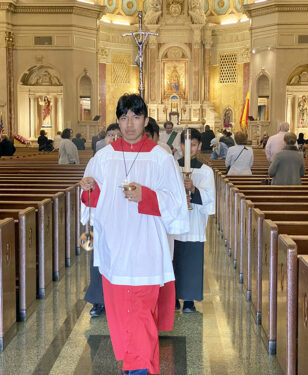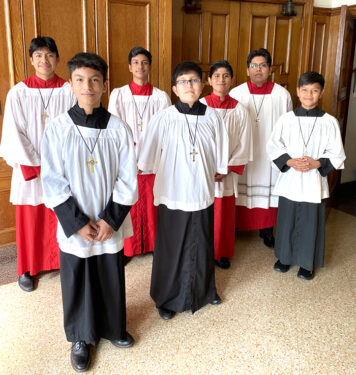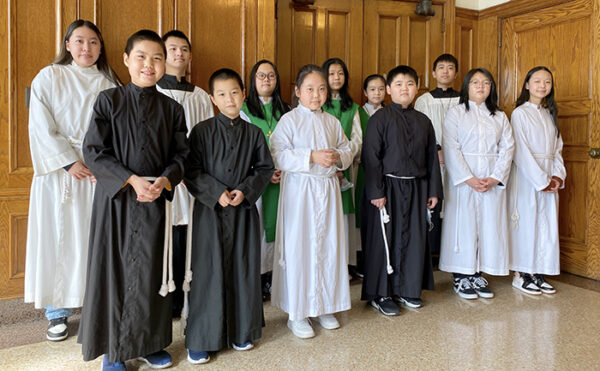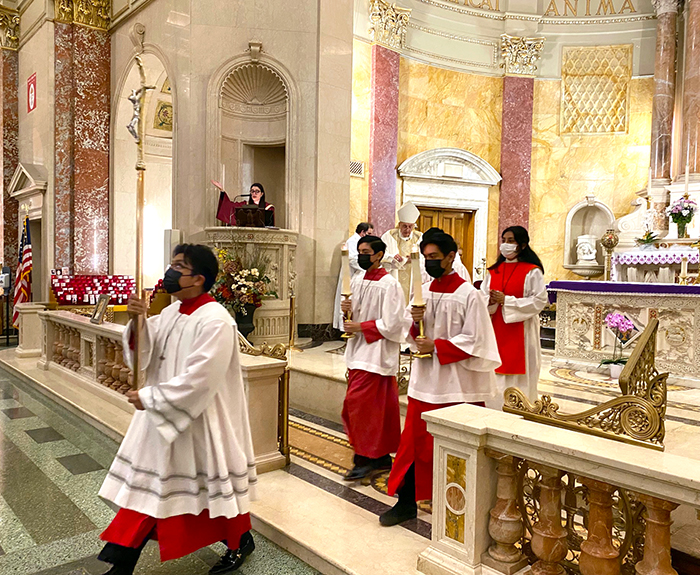
Parish School Students Hear Call to Community and Join Altar Servers With Diversity and Drive
BENSONHURST — Msgr. Ron Marino, pastor at the Basilica of Regina Pacis, has learned that if he offers more Masses, parishioners will come. And altar servers will follow.
Msgr. Marino says attendance is growing at the Sunday Masses — celebrated in English, Spanish, and Chinese — so much that a second Spanish-language Mass was added in April, when much of the Catholic world was still celebrating Mass online.
Along with the growth in Masses, he said, came a need for additional altar servers. In recent years, he explained, the parish valued its team averaging about 10 servers, most aged 7 to 18. However, the team jumped this year, when another 35 servers joined their ranks.
“The youth activities that we have, and friendships with other kids who are officers [in the server team], brings them around,” Msgr. Marino said. “They love it. It’s different from anything else they do, and it concerns God. Nothing else they do concerns God; these are all public school kids. That’s a very big thing I’m proud of.”

He explained the parish has no school or academy, so its youth programs are a crucial tool for recruiting servers. Participants learn to set goals to advance in rank from trainee to regular server and master server. The latter cadre wears red cassocks.
The influx of altar servers could be attributed, in part, to increased immigration from Asian countries or Spanish-speaking regions.
A Pew Research Center study in 2018 showed that more than 6 million immigrants lived in the New York metropolitan area. Also in 2018, the American Immigration Council reported the top three countries of origin of immigrants to New York State were the Dominican Republic (11% of immigrants), China (9%), and Mexico (5%).
Retired Auxiliary Bishop Octavio Cisneros said he was not surprised to hear about the growing ranks of altar servers at Regina Pacis, and he is sure their parents motivate them.
“It’s an honor that the children would be at the table of the Lord,” said Bishop Cisneros, a native of Cuba. “It’s a cultural characteristic. In Hispanics, you always see them — families coming in with the children.
“And remember, for immigrants, the Church means a lot because the Church is where they feel home,” he said. “I can say that personally. When I first came to the United States, I hardly knew any English. So I really felt lost.”
Bishop Cisneros said the sense of separation faded when he went to Mass — which then was celebrated in Latin, as in Cuba. “I felt at home.”
Msgr. Marino said his parish works hard at outreach, but different formulas work for attracting various cultures to Mass.
“In the Spanish-speaking community, the biggest recruiters, so to speak, are Spanish people who invite others to come,” the pastor said. “The Chinese speakers we recruit by different means.”

He explained that in China, many Catholics don’t attend Mass because the government tightly controls religion and conducts surveillance on churches.
When they come to the U.S., they still fear the same government scrutiny. But that dissolves when they finally enter the basilica during food drives, Msgr. Marino said. He noted that eight years ago, there were 10 Mandarin-speaking parishioners, but now there are about 100.
He said Father Joseph Lin’s arrival on the staff nearly a year ago has facilitated the Chinese outreach programs, especially the celebration of the 1:30 Mass in Mandarin, where a dozen altar servers joined in their ministry on one Sunday in October.
Some of these young ladies and men described their parish as a “community.” Serving it, they said, is a privilege.
“It’s sort of like an honor,” said Roy Wu, 17. “I’ve been extremely blessed to have great friends, a great community, and I think doing altar service is the way to give back to the Lord, especially for what God has given to us.”
Wu made his comments as some of the servers were hanging up their cassocks after their ministry at an English-language Mass. But the attire was soon donned by a second group, including some girls, for the Mass in Mandarin.
Some sought help tying the cord-like cinctures around their waists. Wu and some of the experienced servers kindly assisted. A few were shy, but nearly all were quick to smile and laugh with their fellow servers.
The young assistants solemnly performed their duties at all the Masses. Later, a few described being fascinated by the rituals they help perform. Chief among those is the Liturgy of the Eucharist, the portion of the Mass when their faith teaches the bread and wine become the body and blood of Christ.
“Jesus is there spiritually, and in us,” said Johan Reyes, 14. “I really enjoy doing this because it brings you closer to God, and it brings inner peace.”
Wilmer Uguna, 18, is not surprised the younger servers find peace in their work. Msgr. Marino promoted this veteran altar server to lead trainer. He has belonged to the parish for 14 years and is now a freshman at Hunter College.
“When they come here, they definitely feel peace of mind,” Uguna said of his trainees. “Now, with school being more difficult for them — especially since it’s online — they have so many worries. And, so, when they come here they finally feel at peace. They can take a step back and be connected to God.”
Uguna relies on Wu and other masters of ceremonies to help teach the younger trainees.
“I try to have a one-on-one as well with them,” Uguna said of the trainees. “I go over the terms, like the chalice or the ciborium. But, the masters of ceremonies — they really make sure everything’s happening correctly on the altar, and they guide (the trainees) through the Mass.”
Juan Vazquez, 15, is a master of ceremonies who aspires to one day enter the seminary to prepare for the priesthood. He has been an altar server for half of his life.
“I’m still enjoying this, getting to help around the community,” he said. “I enjoy helping the priests, and I just love the concept of being in the church. It’s interesting; we get to do certain rituals that some people don’t do or some people forget.”
Anthony Panjon, 13, also finds the work interesting.
“And it’s kind of fun,” he said. “But I do it just because I want to do it. I wasn’t forced to be here. I wanted to do it.”
Bristol Guarchaj, 13, said he became an altar server in his native country, Guatemala. He continued serving after his family came to the U.S. four years ago.
“I always wanted to do this,” he said. “My older brothers have been doing it since they were kids, and now they are lectors. But I want to stay with God, and help others.”
Msgr. Marino said the altar servers are free to volunteer whenever they choose. For example, a dozen servers donned cassocks for the Oct. 17 Chinese Mass.
“We don’t assign them,” he said. “They just show up.” First-timers enjoy their first experience at the altar, and “they stay.”
“In an age when people are afraid for kids to be around priests, 40-something of them are not afraid to be altar servers here,” Msgr. Marino commented. “That means 40-something parents are not afraid.”
“That’s what I like,” he said. “And we show it off.”


great story